
Dressage is tricky business. They say it takes two lifetimes for a rider to learn how to ride. It's not only tricky for us riders but it also takes a very special horse to make it all the way to Grand Prix. They not only have to have the physical abilities that lend themselves to succeeding in the sport (an ability to collect, for example) but, perhaps even more importantly, they need to have the right mental characteristics too. So, what is it about the sport of dressage that makes it so physically and mentally demanding for the horse?
When we start a young dressage horse we teach them to move forward from the leg, we set boundaries with our hands, and we teach them to yield away from pressure in a calm and relaxed way. As our young dressage horse starts advancing through the levels, the expectations we place upon him increases. What was once acceptable for a 3-year-old is no longer acceptable for our 5-year-old. For example, we accept that our 3-year-old may fall out of balance, throw his head or run into a canter transition. But by the time he is 5 and has been further educated, our expectations have changed to the point where we expect that he will not do those things when we ask for a canter.
The toughest challenge for our horses is learning to collect, and staying collected during each of the exercises. Why is collection so hard? Firstly, even though horses have the physical ability to carry more weight onto their hindquarters, it's really unnatural for most of them. As we all know, horses are designed to carry more weight on their forehand. They feel the most balanced and secure in this state. Then we sit on their backs and ask them to carry both themselves and us in a way that is not physically natural or easy for them. This is very physically demanding for the horse and thus takes years of careful athletic training and systematic development. Secondly, the horse has to be taught to work within a specific set of boundaries. He has to learn to accept pressure and that is something that many horses find mentally challenging. As the horse learns the meaning of our aids, we are able to combine them in ways that work to create boundaries for the horse. It is the mental and physical acceptance of these boundaries that creates collection in the horse. If I were to get on a recently backed three year old dressage horse and applied pressure with my aids in an attempt to engage the hindquarters into collection, the horse would simply run through my hand (at the very least!). At this stage of the game, pressure from behind or the leg simply means " go". The closed hand simply means "whoa". If we as trainers are diligent about teaching our horses to truly accept the basic aids we can eventually use them to develop collection in a way that is less mentally challenging for the horse.
Another unique aspect of our sport that makes dressage training particularly challenging is that our horses need to understand and accept that a relaxation, but not a complete cessation of the aids, is their reward. If you watch a lot of natural horsemanship or reining/cow horse trainers you will notice that they will apply an aid and when the horse responds correctly they will completely remove that aid. Most animal training functions in this way. The pressure is completely removed when the animal does the right thing. The difficulty in dressage, especially in the more advanced work, is that there are very few circumstances where the aids can be completely removed. The horses have to work under varying degrees of pressure at almost all times. Dressage isn't black and white, aid or no aid. It's the dance between the aids where the beauty happens. It's this complexity of what we want that makes dressage very much a mental game with our horses.
Central to all of this is what I call "try". By "try" I mean the desire of the horse to seek the right answer to the question I am asking. I apply an aid/pressure and I want my horse to try to figure out how to get a release or softening of that aid/pressure. If the horse yields to my aid I immediately soften. Every time there is a positive attempt in the direction of my aid there is a reward. It's approaching the training in this way that I attempt to cultivate try. I encourage my horses to find solutions. If they go in the wrong direction to my aid, I don't become stronger, I simply wait it out. I don't want my horses thinking if they do something wrong they get punished. This seeking of an answer must always be encouraged. It's these attempts to solve the problems that are just as important as getting the correct answer. When we get to that moment in training where we introduce or increase collection, my horse will be fully ready to try to figure out what it is I am asking. If I have done my job right, they won't be apprehensive about finding an answer to a new problem.
Cultivate try and reward effort.
Happy Riding!



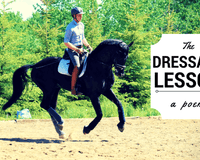
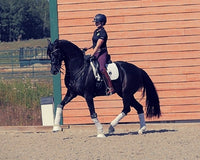
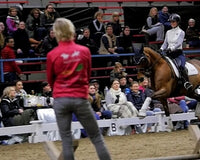
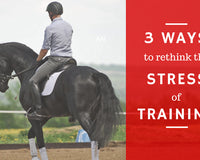
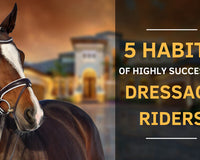
2 comments
Best Horse Calming Supplement
I thoroughly enjoyed reading your post about the challenges and rewards of dressage. It’s refreshing to see an honest and realistic perspective on this discipline, highlighting the dedication and hard work required to excel in it.
As you rightly mentioned, dressage is a complex art form that demands precision, finesse, and a deep connection between horse and rider. It is a continuous journey of growth and improvement, where there is always something new to learn and refine.
While the path of dressage may be challenging, it’s important to remember that there are various tools and resources available to support both horse and rider along the way. One such resource that I have found valuable is the use of best horse calming supplement.
Chelsey
“cultivate try and reward effort” Excellent quote!